Introduction
Welcome to Chunav Parchar, a leading political campaign management company that Specializes in helping political parties and candidates win elections. With the upcoming 2023 Rajasthan elections, we understand the importance of developing an effective political campaign strategy that can connect with voters and win their support.
At Chunav Parchar, we have a team of experienced political strategists, campaign managers, digital marketing experts, and data analysts who work together to create a winning campaign for our clients. We understand that every election is unique, and we tailor our approach to meet the specific needs and goals of each candidate and party we work with.
Our services include developing a comprehensive campaign plan, conducting market research and data analysis, creating compelling messaging and branding, designing and implementing effective advertising and outreach campaigns, and leveraging the latest digital marketing and social media tools to reach voters where they are.
What is a Political Campaign?
A political campaign is a planned effort by a candidate or a political party to promote their ideas, policies, and platform to the public in order to gain support and win an election. Political campaigns typically involve a range of activities such as advertising, public speeches, rallies, door-to-door canvassing, and social media outreach.
In the context of your company name, “Chunav Parchar,” it appears to be a Hindi phrase that roughly translates to “Election Campaign” in English. As such, it suggests that your company is likely involved in providing services related to political campaigning, such as advertising, public relations, and other forms of communication to help political candidates or parties gain support during an election.
A political campaign is a series of organized efforts by a political candidate or political party to persuade voters to support them and their political platform. Political campaigns are typically designed to win elections and gain political power.
Political campaigns can take many forms and use a variety of tactics to reach voters. This may include rallies, speeches, debates, door-to-door canvassing, phone banking, social media, and other forms of advertising and outreach.
Campaigns typically begin several months before an election and are focused on building support and momentum leading up to election day. The goal is to persuade as many voters as possible to cast their ballot in favor of the candidate or party running the campaign.
Political campaigns are a fundamental part of democratic societies, as they provide citizens with the opportunity to participate in the political process and have their voices heard.
Who is a Campaign Manager?
A campaign manager is the person responsible for overseeing and coordinating a political campaign. They are typically hired by a political candidate or party to help plan, execute and manage various aspects of the campaign.
The campaign manager’s main responsibilities include developing and implementing campaign strategies, managing the campaign budget, hiring and supervising staff and volunteers, coordinating fundraising efforts, organizing events and rallies, and overseeing the production of campaign materials such as advertisements and literature.
The campaign manager works closely with the candidate or party leadership to ensure that the campaign is aligned with their goals and values, and to make any necessary adjustments along the way. They are also responsible for tracking the campaign’s progress, analyzing polling data and voter demographics, and adjusting the campaign strategy as needed to ensure the best possible outcome on election day.
A successful campaign manager must be highly organized, have strong leadership skills, and be able to work under high-pressure situations. They must also have a deep understanding of the political process and be able to navigate complex legal and regulatory requirements that govern political campaigns.
What Are the Responsibilities of a Campaign Manager?
The responsibilities of a campaign manager can vary depending on the size and scope of the campaign, as well as the specific needs of the candidate or political party. However, some common responsibilities of a campaign manager include:
- Developing and Implementing Campaign Strategies: The campaign manager is responsible for developing a comprehensive plan to achieve the campaign’s goals, which may include voter outreach, fundraising, advertising, and events.
- Managing the Campaign Budget: The campaign manager must keep track of campaign finances and ensure that spending is aligned with the campaign strategy and goals.
- Hiring and Supervising Staff and Volunteers: The campaign manager is responsible for recruiting, hiring, and managing staff and volunteers to carry out various campaign tasks.
- Coordinating Fundraising Efforts: The campaign manager works with the candidate and party leadership to develop fundraising strategies and ensure that fundraising goals are met.
- Organizing Events and Rallies: The campaign manager is responsible for planning and executing events and rallies to mobilize supporters and attract new voters.
- Overseeing the Production of Campaign Materials: The campaign manager works with designers, writers, and other professionals to produce campaign materials such as advertisements, mailers, and signs.
- Tracking Campaign Progress and Adjusting Strategies: The campaign manager must monitor the progress of the campaign, analyze polling data and voter demographics, and make adjustments to the campaign strategy as needed to ensure the best possible outcome on election day.
- Managing Communications: The campaign manager is responsible for managing the candidate’s public image and communicating with the media, voters, and other stakeholders.
What are the Skills Required to be a Campaign Manager?

Being a successful campaign manager requires a diverse set of skills and abilities. Here are some of the key skills required to be a successful campaign manager:
- Leadership: Campaign managers must be able to lead and motivate staff and volunteers, and provide direction and guidance to the campaign team.
- Strategic Thinking: Campaign managers must be able to develop and implement a comprehensive campaign strategy that aligns with the candidate’s goals and values.
- Communication: Campaign managers must be skilled communicators who can effectively convey the campaign’s message to voters, the media, and other stakeholders.
- Organization: Campaign managers must be highly organized and able to manage multiple tasks and priorities in a fast-paced and often unpredictable environment.
- Resource Management: Campaign managers must be able to effectively manage the campaign’s budget and resources, including staff and volunteers.
- Analytical Thinking: Campaign managers must be able to analyze polling data, voter demographics, and other information to make data-driven decisions about the campaign strategy.
- Political Knowledge: Campaign managers must have a deep understanding of the political process, including laws and regulations governing political campaigns.
- Problem-Solving: Campaign managers must be able to quickly identify and address problems that arise during the campaign, and find creative solutions to overcome obstacles.
- Flexibility: Campaign managers must be able to adapt to changing circumstances and adjust the campaign strategy as needed to ensure the best possible outcome on election day.
How to Run a Political Campaign?
Running a political campaign requires a lot of planning, effort, and resources. Here are some general steps you can follow to run a political campaign:
- Develop a Campaign Plan: Start by developing a comprehensive campaign plan that includes goals, strategies, and tactics for achieving those goals. This plan should outline a clear message, target audience, and a plan for reaching them.
- Build a Campaign Team: Recruit a team of volunteers, staff, and advisors who can help with various aspects of the campaign. This team should be diverse, motivated, and skilled in areas such as fundraising, communications, and voter outreach.
- Raise Funds: Develop a fundraising strategy and start raising funds as early as possible. This can include hosting fundraising events, soliciting donations from supporters, and applying for grants.
- Build Name Recognition: Build awareness of the candidate and the campaign by attending community events, speaking at public forums, and using social media and other advertising platforms to promote the campaign.
- Voter outreach: Develop a plan for reaching out to voters, including door-to-door canvassing, phone banking, and digital outreach. Focus on targeting likely supporters and persuadable voters.
- Get Out the Vote: On election day, make sure supporters get out to vote by organizing a strong get-out-the-vote effort. This may include providing transportation to the polls, reminding voters of their polling location, and making sure voters know what they need to bring with them to vote.
- Monitor and Adjust the Campaign: Monitor the campaign’s progress throughout the election season and make adjustments as needed. This may include adjusting the message, shifting resources to more effective strategies, or making personnel changes if necessary.
- Compliance: Ensure that the campaign is in compliance with all applicable laws and regulations, including campaign finance rules, voter registration requirements, and election day procedures.
The Role of Social Media in Political Campaigns
Social media has become an increasingly important tool for political campaigns in recent years. Here are some of the roles that social media plays in political campaigns:
- Reach: Social media platforms have billions of users, making them a powerful tool for reaching a large audience quickly and easily.
- Engagement: Social media allows campaigns to engage directly with supporters and potential voters in a more personal and interactive way than traditional media.
- Fundraising: Social media can be used to solicit donations from supporters, either through targeted fundraising campaigns or by making it easy for people to donate through social media platforms.
- Messaging: Social media platforms can be used to promote a campaign’s message and values, as well as to respond to criticism or attacks from opponents.
- Data Collection: Social media platforms can provide valuable data about potential voters, including their demographic information, interests, and political affiliations.
- Mobilization: Social media can be used to mobilize supporters, encouraging them to take action such as volunteering, attending events, or getting out to vote on election day.
- Influence: Social media can be used to influence public opinion and shape the narrative of a campaign. It can also be used to target specific groups of voters with tailored messages.
- Crisis Management: Social media can be used to manage crises and respond to negative news or attacks from opponents in real-time.
Conclusion
As the 2023 Rajasthan Elections approach, political campaign management will be crucial for candidates seeking office. Effective campaign management involves a well-planned strategy, a strong campaign team, and the use of modern campaign tactics such as social media outreach, targeted messaging, and data-driven analytics. Campaign managers play a vital role in overseeing these efforts, coordinating resources, and adjusting the campaign’s approach based on feedback and data analysis. With the right approach and leadership, political candidates can successfully navigate the complexities of the campaign trail and build a strong base of support to win the hearts and minds of Rajasthan’s voters.

